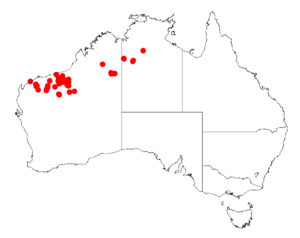Acacia ptychophylla facts for kids
Quick facts for kids Acacia ptychophylla |
|
|---|---|
| Scientific classification |
|
| Kingdom: | Plantae |
| Clade: | Tracheophytes |
| Clade: | Angiosperms |
| Clade: | Eudicots |
| Clade: | Rosids |
| Order: | Fabales |
| Family: | Fabaceae |
| Clade: | Mimosoideae |
| Genus: | Acacia |
| Species: |
A. ptychophylla
|
| Binomial name | |
| Acacia ptychophylla |
|
 |
|
| Occurrence data from AVH | |
| Script error: The function "autoWithCaption" does not exist. | |
Script error: No such module "Check for conflicting parameters".
Acacia ptychophylla is a special kind of shrub that belongs to the Acacia family. It's found only in the dry, hot areas of north-western Australia. This plant is known for its unique look and how it survives in tough conditions.
Contents
What Does Acacia ptychophylla Look Like?
This bushy shrub usually grows between 0.6 and 2.5 meters (about 2 to 8 feet) tall. It often has many stems and can be flat on top or rounded. Its branches are smooth and have a reddish-brown color. The very tips of the branches are often yellow-green.
Leaves and Flowers
Like many Acacia plants, Acacia ptychophylla doesn't have true leaves. Instead, it has what are called phyllodes. These are flattened leaf stems that act like leaves. The phyllodes are smooth, tough, and stay green all year. They are shaped like a long oval and are usually straight. Each phyllode is about 2 to 5.5 centimeters long and 3 to 10 millimeters wide. They often have a small, hard tip and usually show five to eight clear lines running along them.
This plant blooms from April to August, producing bright yellow flowers. The flowers grow in upright, cylinder-shaped spikes. These flower spikes are about 2 to 4.5 centimeters long and are packed with golden flowers.
Seed Pods and Seeds
After the plant flowers, it forms flat, woody seed pods that are covered in a sticky resin. These pods are shaped like a narrow oval, becoming thinner at the base. They are light brown, either straight or slightly curved, and measure about 5 to 7 centimeters long. The pods have lines running across them. Inside the pods are brown seeds, which are about 4 to 5 millimeters long and shaped like a long oval.
Where Does Acacia ptychophylla Grow?
Acacia ptychophylla is found in several dry regions of Western Australia. These areas include the Pilbara, the southern part of the Kimberley, and the far northern Goldfields regions. It likes to grow in stony soils and gritty areas, often found along creek beds or on rocky hills.
This plant also grows in a separate area in the Northern Territory, specifically around the Hooker Creek region. Here, it is often found on sandy plains or rocky slopes. It usually grows as part of plant communities that include spinifex grasses.
 | James Van Der Zee |
 | Alma Thomas |
 | Ellis Wilson |
 | Margaret Taylor-Burroughs |

